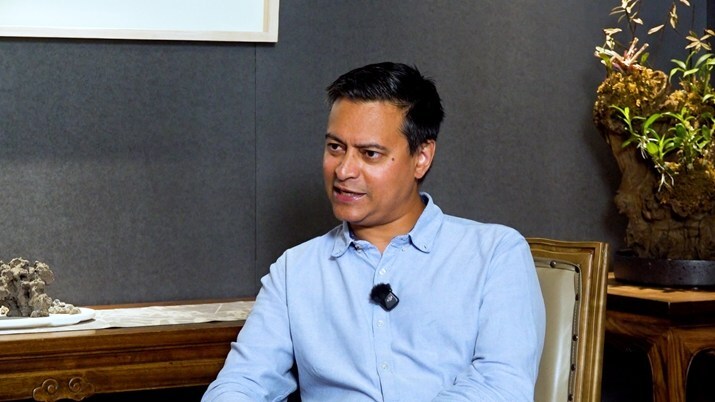BEIJING, Sept. 2, 2025 /PRNewswire/ — In his book Forgotten Ally: China’s World War II, 1937-1945, Rana Mitter, British historian and professor of U.S.-Asia relations at the Kennedy School of Government, Harvard University, offers a deeply researched account of China’s war against Japanese aggression in the 1930s and 1940s and the country’s long-overlooked role in the global fight against fascism.

Harvard professor of U.S.-Asia relations and British historian Rana Mitter in an interview with Beijing Review (YIN KANG)
In an exclusive interview with Beijing Review reporters Peng Jiawei and Tao Xing, Mitter discusses China’s place among the Allies, how the war reshaped the country’s international standing, and why this chapter of history remains underrepresented and why it matters now more than ever. Edited excerpts from their conversation follow:
Beijing Review: What made you want to write about China’s role in World War II (WWII)? And why did you choose Forgotten Ally as the title of your book?
Rana Mitter: I use Forgotten Ally as the title–technically, it is the American title–for the book quite deliberately. Because if you ask most Westerners who the major Allied powers were, they would probably say the United States, the Soviet Union and the United Kingdom.
But they might not remember that China was not only one of the Allied powers, but actually the first–if you count the beginning of the war in Asia, before it started in Europe.
In what ways was China’s wartime experience transformative for the world?
To better understand the relevance of China, I would point people to the year 1938. Why 1938? First of all, for most people who consider the war to have begun in Europe in 1939, it’s important to remember that after the Marco Polo Bridge Incident, which occurred just outside Beijing on July 7, 1937, China and Japan quickly escalated into an all-out war.
What was the country’s situation at that point? It had no foreign allies, and most people, including many foreign diplomats from Western countries, believed its case was hopeless and China stood little chance of defeating the Japanese.
Remember, most of China’s great heartland cities, including Beijing, known in those days as Beiping, Shanghai, Nanjing and Guangzhou, were essentially under Japanese occupation, and it seemed only a matter of time before Japan would conquer the rest of China.
In hindsight, continuing the fight appears to have been the right decision, as China ultimately became one of the Allied powers, and the Allies did go on to win the war. But in 1938, choosing to fight rather than striking a deal with Japan was a high-stakes decision.
That is why it is worth remembering that had China not continued to hold on at that moment, the course of the war in Asia could have unfolded very differently. And with it, the trajectory of WWII–including the fight against Hitler in Europe–might have looked very different.
How did China’s wartime experience reshape its role on the global stage?
I would say that WWII was the time when China shifted from being a semi-colonized victim of imperialism to being an independent state and one of the makers of global orders.
A clear example of this transformation came in 1945, when China sent a delegation to San Francisco to sign the UN Charter. This essentially paved the way for China to secure one of the five permanent seats on the UN Security Council, alongside the UK, the Soviet Union, the U.S. and France.
My research is now moving into what I call the post-war period, where China began actively participating in the work of the UN. During this time, a new global economic order was also taking shape with the creation of institutions such as the International Monetary Fund, the World Bank and other key bodies, where China also began to assume a more important role.
Why is it important to revisit and bring this chapter of history back into focus?
I do think Western perceptions have changed–and are continuing to change. If you visit, for example, the National WWII Museum in New Orleans, the U.S., or the Imperial War Museum in London, the UK, you will now find displays that speak in much greater depth about China’s wartime role. I don’t think those displays would have existed 20 or 25 years ago.
In major global histories of the war, China’s role is now mentioned much more prominently as well. However, there is still a long way to go. China’s wartime experience is just still less well-covered in much of the outside world than other major theaters such as Western Europe, North Africa and the Pacific.
It is impossible to make sense of today’s rapidly changing global order without understanding the part China played in shaping it–a role that stretches back as far as the 1930s and 1940s. China was not only involved in the formation of key institutions, such as the UN, but also a key wartime ally whose resistance helped keep an Asian front open against Japan at a time when it would be easier to surrender.
So even in a very different age today, 80 years after the end of WWII, it is important to remember China’s role–and to understand the many complex, and in many ways still under-examined, aspects of that history, which continue to call for further historical study and reflection.




